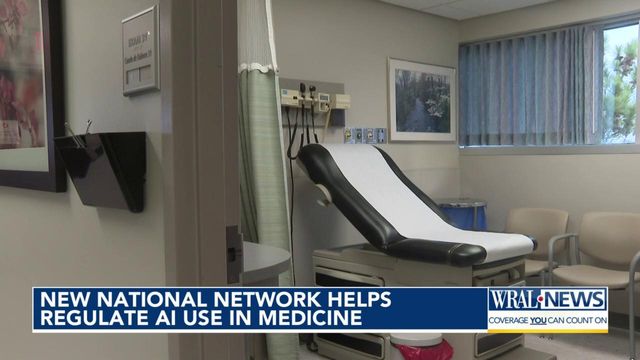New national network aims to establish safety tools for AI use in medicine
Healthcare leaders this week announced the launch of a new national network aimed at establishing safety guidance and tools for integrating artificial intelligence in medicine.
During a global conference in Orlando, health experts announced it is called the Trustworthy & Responsible AI Network (TRAIN).
Duke Health Chief Data Scientist Michael Pencina is among the members looking at how to safely integrate new technology into healthcare systems.
“There is a lot of interest, hunger and commitment to really employing AI in a trustworthy way. I have not met a health system representative that would not be dedicated to trustworthy application,” Pencina said.
He continued, “There is a lot of positive momentum. Health systems are realizing this is a defining moment and we need to do it in a responsible way.”
TRAIN will essentially work to further expand guidelines set forth by the Coalition for Health AI in April 2023.
The goal is to further create principles, best practice standards and tools that would allow for integration of AI algorithms to be standardized across health systems throughout the country.
“One of the best practices in the blueprint calls for transparency of AI,” explained Pencina. “We want AI to be transparent – but what does it mean for AI to be transparent? The guide takes it one step further and says we should register AI algorithms operating in our health systems.”
Pencina said he views AI-use in medicine in three main ways: clinical, operational and basic science application.
He explained clinical applications could involve the use of voice detection technology to help transcribe notes during an appointment so that doctors or nurses could spend less time typing on a computer and more time speaking directly to patients.
Operational use of AI could cover things like algorithms used to detect breast cancer before the human eye could spot a tumor on a mammogram.
- App scans user's face, monitors voice for signs of anxiety, depression
- Artificial intelligence chatbot could help NC students with mental health support
The third application, basic science, is where Pencina believes lies “unprecedented potential.”
“Many people believe some of the greatest progress for humanity will be in this space,” he said.
The scientist continued, “I was at another conference last week in Texas and people were taking bets on what percentage of drugs will come on the market saving lives in the next 20 years that wouldn’t be possible without AI. People were saying maybe 30-50%. So, we’re talking about huge numbers here.”
One company using AI to help with drug research is Dotmatics. The company, headquartered in Boston, runs 14 offices globally.
Its main service is providing software and algorithms to scientists across the country to help speed up their research process by gathering data quicker.
Alister Campbell, Dotmatics vice president and head of science and technology, explained using tech in this way can ultimately help get new drugs to market, faster.
“On average getting a drug to market costs approximately $2 billion, and it takes, on average, a decade,” said Campbell. “That’s a long time to get something into the hands of patients that need it, so what we’re trying to do is get candidates to the clinic that have a chance of success.”
On Friday morning, FDA Commissioner Dr. Robert Califf weighed in on the conversation surrounding AI.
He said in part, “AI has the potential to enable major advances in the development of more effective, less risky medical products and more nutritious food.”
The FDA reported it has received over 300 submissions for drugs and biological products with AI components and over 700 submissions for AI-enabled devices, since 1995.
Califf also added the agency is currently exploring its own use of AI technology to “facilitate internal operations and regulatory processes.”
Pencina said he encourages exploration of AI in new ways and believes it will have a tremendous impact on scientific research and the entire healthcare field.
Still, he urges caution across the board moving forward adding, “If we lose track of what’s happening where, we as humans lose control of what is happening.











